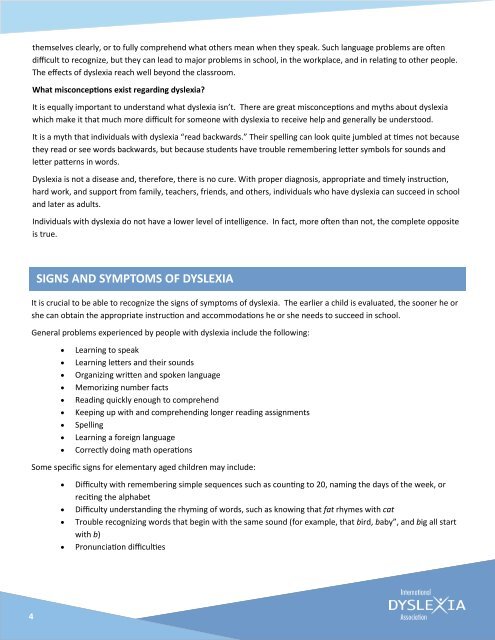Overcoming Dyslexia
Overcoming Dyslexia
Overcoming Dyslexia
Create successful ePaper yourself
Turn your PDF publications into a flip-book with our unique Google optimized e-Paper software.
themselves clearly, or to fully comprehend what others mean when they speak. Such language problems are often<br />
difficult to recognize, but they can lead to major problems in school, in the workplace, and in relating to other people.<br />
The effects of dyslexia reach well beyond the classroom.<br />
What misconceptions exist regarding dyslexia?<br />
It is equally important to understand what dyslexia isn’t. There are great misconceptions and myths about dyslexia<br />
which make it that much more difficult for someone with dyslexia to receive help and generally be understood.<br />
It is a myth that individuals with dyslexia “read backwards.” Their spelling can look quite jumbled at times not because<br />
they read or see words backwards, but because students have trouble remembering letter symbols for sounds and<br />
letter patterns in words.<br />
<strong>Dyslexia</strong> is not a disease and, therefore, there is no cure. With proper diagnosis, appropriate and timely instruction,<br />
hard work, and support from family, teachers, friends, and others, individuals who have dyslexia can succeed in school<br />
and later as adults.<br />
Individuals with dyslexia do not have a lower level of intelligence. In fact, more often than not, the complete opposite<br />
is true.<br />
SIGNS AND SYMPTOMS OF DYSLEXIA<br />
It is crucial to be able to recognize the signs of symptoms of dyslexia. The earlier a child is evaluated, the sooner he or<br />
she can obtain the appropriate instruction and accommodations he or she needs to succeed in school.<br />
General problems experienced by people with dyslexia include the following:<br />
<br />
<br />
<br />
<br />
<br />
<br />
<br />
<br />
<br />
Learning to speak<br />
Learning letters and their sounds<br />
Organizing written and spoken language<br />
Memorizing number facts<br />
Reading quickly enough to comprehend<br />
Keeping up with and comprehending longer reading assignments<br />
Spelling<br />
Learning a foreign language<br />
Correctly doing math operations<br />
Some specific signs for elementary aged children may include:<br />
<br />
<br />
<br />
<br />
Difficulty with remembering simple sequences such as counting to 20, naming the days of the week, or<br />
reciting the alphabet<br />
Difficulty understanding the rhyming of words, such as knowing that fat rhymes with cat<br />
Trouble recognizing words that begin with the same sound (for example, that bird, baby”, and big all start<br />
with b)<br />
Pronunciation difficulties<br />
4

















